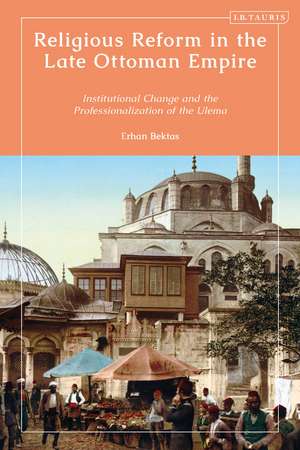Religious Reform in the Late Ottoman Empire: Institutional Change and the Professionalisation of the Ulema
Autor Erhan Bektasen Limba Engleză Paperback – 26 iun 2024
| Toate formatele și edițiile | Preț | Express |
|---|---|---|
| Paperback (1) | 191.22 lei 6-8 săpt. | |
| Bloomsbury Publishing – 26 iun 2024 | 191.22 lei 6-8 săpt. | |
| Hardback (1) | 510.42 lei 6-8 săpt. | |
| Bloomsbury Publishing – 28 dec 2022 | 510.42 lei 6-8 săpt. |
Preț: 191.22 lei
Preț vechi: 249.30 lei
-23% Nou
Puncte Express: 287
Preț estimativ în valută:
36.59€ • 37.99$ • 30.51£
36.59€ • 37.99$ • 30.51£
Carte tipărită la comandă
Livrare economică 22 martie-05 aprilie
Preluare comenzi: 021 569.72.76
Specificații
ISBN-13: 9780755645510
ISBN-10: 0755645510
Pagini: 232
Dimensiuni: 156 x 234 x 25 mm
Greutate: 0.33 kg
Editura: Bloomsbury Publishing
Colecția I.B.Tauris
Locul publicării:London, United Kingdom
ISBN-10: 0755645510
Pagini: 232
Dimensiuni: 156 x 234 x 25 mm
Greutate: 0.33 kg
Editura: Bloomsbury Publishing
Colecția I.B.Tauris
Locul publicării:London, United Kingdom
Caracteristici
Includes original archival research in the Ottoman state archives and the archives of the official institution of the ulema
Notă biografică
Erhan Bektas is Assistant Professor of History at Üsküdar University, Turkey. He has previously published peer reviewed articles in journals such as Middle Eastern Studies, International Journal of History Studies and the Journal of Ottoman Legacy Studies.
Cuprins
1. Introduction2. The Re-Organazation of the Seyhulislam Office (1826-1914)3. The Ulema's Educational Career (1839-1922)4. The Ulema's Proessional Career (1880-1920)5. A Social Profile Of the Ulema: A Prosopographical Study (1880-1920)6. The Ulema In The Context Of Everyday Social Life7. Conclusion
Recenzii
A thrilling account of the everyday life of Ottoman ulema based on unique quantitative data. It provides an understanding of what an average Ottoman alim's life looked like outside of the elite circles of scholars. A blend of institutional history of the Seyhülislam's Office and new roles and positions the ulema acquired within society during the final decades of the Empire.
This book provides an interesting reassessment of late Ottoman scholars and their place during a time of imperial transformation and reform. Using prosopographical analysis, Bektas's study paints a rich picture of Ottoman religious scholars as mobile, politically-engaged functionaries who not only responded to institutional and social changes happening around them, but were important forces in shaping their world.
This book provides an interesting reassessment of late Ottoman scholars and their place during a time of imperial transformation and reform. Using prosopographical analysis, Bektas's study paints a rich picture of Ottoman religious scholars as mobile, politically-engaged functionaries who not only responded to institutional and social changes happening around them, but were important forces in shaping their world.
